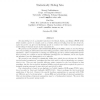20 search results - page 4 / 4 » ctrsa 2009 |
CTRSA
2009
Springer
13 years 11 months ago
2009
Springer
Proxy re-encryption (PRE) allows a proxy to convert a ciphertext encrypted under one key into an encryption of the same message under another key. The main idea is to place as lit...
CTRSA
2009
Springer
13 years 11 months ago
2009
Springer
Zero-knowledge set is a primitive introduced by Micali, Rabin, and Kilian (FOCS 2003) which enables a prover to commit a set to a verifier, without revealing even the size of the...
CTRSA
2009
Springer
13 years 11 months ago
2009
Springer
Abstract. A redactable signature scheme for a string of objects supports verification even if multiple substrings are removed from the original string. It is important that the re...
CTRSA
2009
Springer
13 years 8 months ago
2009
Springer
In many applications, it is desirable to work with signatures that are both short, and yet where many messages from different signers be verified very quickly. RSA signatures sati...
CTRSA
2011
Springer
12 years 8 months ago
2011
Springer
Non-malleability of a cryptographic primitive is a fundamental security property which ensures some sort of independence of cryptographic values. The notion has been extensively st...

